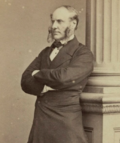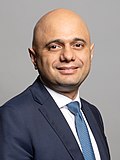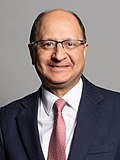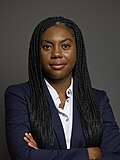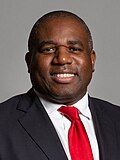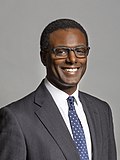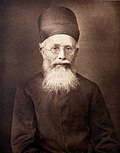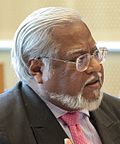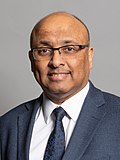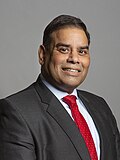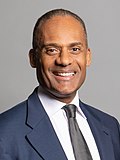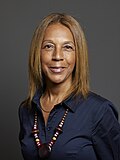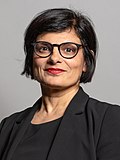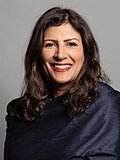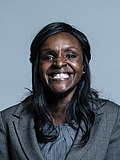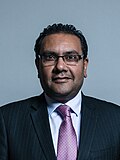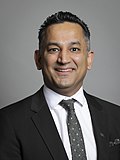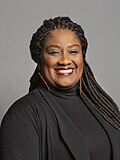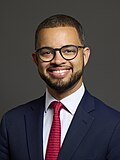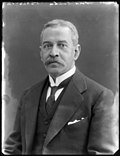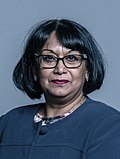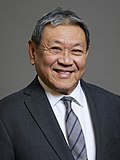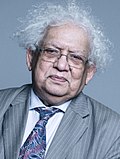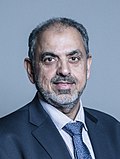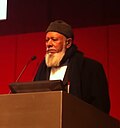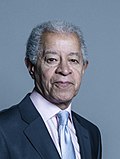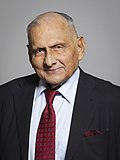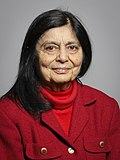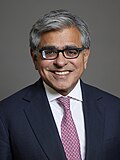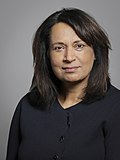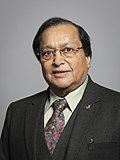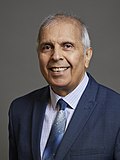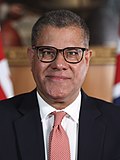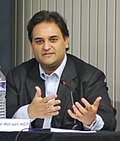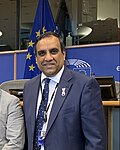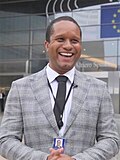Lists of ethnic minority politicians in the United Kingdom
 From Wikipedia - Reading time: 30 min
From Wikipedia - Reading time: 30 min
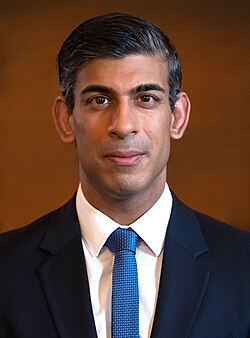
These are lists of people who belong to non-European ethnic minorities and have been elected as Members of the House of Commons of the United Kingdom, European Parliament, and other British devolved bodies, as well as members of the non-elected House of Lords.
Definitions
[edit]A research briefing published by the House of Commons of the United Kingdom Library in 2023 notes that:
There is no official list of the religious or ethnic background of Members of Parliament. MPs are not required to declare this information and we therefore rely on external sources and any records of self-identification by MPs. Differing understandings of and attitudes towards ethnicity mean it is difficult to be certain about when the first MP from a minority ethnic background entered Parliament and how many MPs from minority ethnic backgrounds there have been since.[1]
According to a research paper from House of Commons Library, published in 2020, the first ethnic minority MP was elected in 1767[2] – excluding Jews, who a House of Commons Library briefing paper states generally considered themselves to be a religious rather than an ethnic minority in the 18th/19th century.[3] This was James Townsend, a Whig MP who was of one-eighth African ancestry and who later went on to become Mayor of London in 1772.[4]
Following the election of Anas Sarwar as Scottish Labour Party leader in February 2021, he was described as the first person from an ethnic minority to lead a major British political party,[5] which led to debate about why Jewish party leaders had been excluded from this comparison.[6][7][8] Stephen Bush, the political editor of the New Statesman, wrote that "As far as British law is concerned, the answer is open-and-shut: we count as both an ethnic and a religious grouping for the purpose of equalities and employment law." He stated: "Whether Benjamin Disraeli would feel today that he were an ethnic-minority Briton is unknowable: but we can say with copper-bottomed certainty that he and other ethnically-Jewish Britons faced what we would now recognise as workplace discrimination in addition to the open dissemination of racist tropes about Disraeli and his family by his political opponents."[8] The House of Commons Library briefing paper notes that the first practising Jew to sit in the Commons was Lionel de Rothschild, who was first elected in 1847 but who refused to take the Christian oath that MPs are required to swear. He took his seat once the rules had been changed, allowing him to swear on the Old Testament.[3]
Commenting on an initial estimate of the number of ethnic minority MPs elected in the 2024 general election published by think tank British Future, academic Maria Sobolewska notes that this estimate defines "ethnic minority" by "Using the 2021 Census primary criterion of ethnic minority as anyone who identifies as other than White".[9]
Academic research
[edit]In 2001, Muhammad Anwar of Warwick University wrote a paper titled "The participation of ethnic minorities in British politics" that was published in the Journal of Ethnic and Migration Studies (2001) that in part examined the representation of ethnic minorities at national levels of the British political system.[10] In a chapter in the edited book Race and British Electoral Politics (Routledge, 1998), Andrew Geddes, now Professor of Politics at University of Sheffield, explored the question of "what factors contribute to low levels of ethnic minority representation in the House of Commons".[11]
Statistics
[edit]At the 2001 general election, the Parliament of the United Kingdom had twelve ethnic minority Members of Parliament (excluding Jews), and after the 2005 general election; that number increased to fifteen.[12] With the 2010 general election, the Parliament of the United Kingdom reported that the number of ethnic minority MPs increased by nearly three-quarters, to a total of 26.[13] The first three Muslim female MPs were elected.[13] All ethnic minority MPs were either Labour (15) or Conservative (11).[13] In October 2013, the UK Parliament reported that the number of ethnic minority MPs stood at 27, or 4.2% of the total.[14]
After the 2015 general election, 41 MPs from an ethnic minority background were elected to Parliament. 25 of the previous 27 ethnic minority MPs retained their seats and were joined by 16 new ethnic minority MPs. 23 were from the Labour Party, 17 of them were Conservatives and one from the SNP.[15] In the 2017 general election, 52 ethnic minority MPs were elected, including 32 Labour MPs, 19 Conservatives and one Liberal Democrat, according to British Future[16] and the House of Commons Library.[3][17] In the 2019 general election, this figure rose to 66, with 23 Conservative, 41 Labour and two Liberal Democrat non-white MPs.[18] After the 2024 general election, the House of Commons had 90 ethnic minority MPs according to initial calculations,[9] including 66 from the Labour Party, 15 Conservatives, five Liberal Democrats and four independent MPs.[19]
Based on data from unofficial sources including Operation Black Vote, the House of Commons Library estimated in a research briefing published in September 2022 that there were 55 ethnic minority members of the House of Lords as of September 2022[update]. Of these, 11 were affiliated with the Labour Party, 16 were crossbenchers, 16 were Conservatives, six were Liberal Democrats, and six were unaffiliated.[18]
House of Commons
[edit]Prime Ministers of the United Kingdom in the House of Commons
[edit]| Party | Portrait | Name | Constituency | First office held | Year appointed | Ethnicity | |
|---|---|---|---|---|---|---|---|
| Conservative | 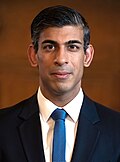
|
Rishi Sunak[20] | Richmond (Yorks) | Prime Minister of the United Kingdom | 2022 | British Indian | |
Leader of the Opposition in the House of Commons
[edit]| Party | Portrait | Name | Constituency | First office held | Year appointed | Ethnicity | |
|---|---|---|---|---|---|---|---|
| Conservative | 
|
Rishi Sunak | Richmond and Northallerton | Leader of the Opposition | 2024 | British Indian | |
| Conservative | 
|
Kemi Badenoch | North West Essex | 2024 | Black British | ||
Members of the Cabinet in the House of Commons
[edit]Ministers in the House of Commons
[edit]Speaker of the House of Commons
[edit]| Party | Portrait | Name | Constituency | First office held | Year appointed | Ethnicity | |
|---|---|---|---|---|---|---|---|
| Conservative | 
|
Douglas Clifton Brown | Hexham | Speaker of the House of Commons | 1943 | Black British/White British (Mixed) | |
Chairman of Ways and Means
[edit]| Party | Portrait | Name | Constituency | First office held | Year appointed | Ethnicity | |
|---|---|---|---|---|---|---|---|
| Conservative | 
|
Douglas Clifton Brown | Hexham | Chairman of Ways and Means | 1939 | Black British/White British (Mixed) | |
| Conservative | 
|
Nus Ghani | Sussex Weald | Chairman of Ways and Means | 2024 | British Pakistani | |
Members of Parliament
[edit]House of Lords
[edit]Members of the Cabinet in the House of Lords
[edit]| Party | Portrait | Name | First office held | Year appointed | Ethnicity | |
|---|---|---|---|---|---|---|
| Labour | 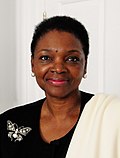
|
Valerie Amos, Baroness Amos[95] | Secretary of State for International Development | 2003 | Black British | |
| Labour | 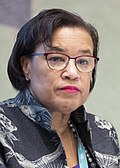
|
Patricia Scotland, Baroness Scotland[96] | Attorney General for England and Wales (attending Cabinet) | 2007 | Black British | |
| Conservative | 
|
Sayeeda Warsi, Baroness Warsi[97] | Minister without Portfolio (attending Cabinet) | 2010 | British Pakistani | |
Ministers in the House of Lords
[edit]Members of the House of Lords
[edit]European Parliament
[edit]Greater London Authority
[edit]Mayors of London
[edit]| Party | Portrait | Name | Constituency | Year elected | Year left | Reason for tenure ending | Ethnicity | |
|---|---|---|---|---|---|---|---|---|
| Labour | 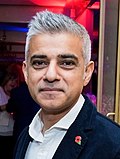
|
Sadiq Khan | Mayor of London | 2016 | Serving | British Pakistani[136] | ||
Deputy Mayors of London
[edit]| Party | Portrait | Name | Role | Year appointed | Ethnicity | |
|---|---|---|---|---|---|---|
| Conservative | Ray Lewis | Deputy Mayor for Young People | 2008 | Black British[137] | ||
| Conservative | Munira Mirza | Deputy Mayor for Education and Culture | 2012 | British Pakistani[138] | ||
| Labour | Rajesh Agarwal | Deputy Mayor for Business | 2016 | British Indian | ||
| Labour | Shirley Rodrigues | Deputy Mayor for Environment and Energy | 2016 | British Indian | ||
| Labour | Debbie Weekes-Bernard | Deputy Mayor for Communities and Social Justice | 2018 | Black British[139] | ||
London Assembly
[edit]Chairs of the London Assembly
[edit]| Party | Portrait | Name | Constituency | First office held | Year appointed | Ethnicity | |
|---|---|---|---|---|---|---|---|
| Labour | 
|
Trevor Phillips | London-wide | Chair of the London Assembly | 2002 | Black British | |
| Labour Co-op | 
|
Jennette Arnold | London-wide | Chair of the London Assembly | 2008 | Black British | |
| Labour | 
|
Navin Shah | Brent and Harrow | Chair of the London Assembly | 2020 | British Indian | |
| Labour | 
|
Onkar Sahota | Ealing and Hillingdon | Chair of the London Assembly | 2022 | British Indian | |
London Assembly Members
[edit]Scottish Parliament
[edit]First Ministers of Scotland
[edit]| Party | Portrait | Name | Constituency | First office held | Year appointed | Ethnicity | |
|---|---|---|---|---|---|---|---|
| SNP | 
|
Humza Yousaf[141] | Glasgow | First Minister of Scotland | 2023 | British Pakistani | |
Members of the Scottish Cabinet in the Scottish Parliament
[edit]| Party | Portrait | Name | Constituency | First office held | Year appointed | Ethnicity | |
|---|---|---|---|---|---|---|---|
| SNP | 
|
Humza Yousaf[141] | Glasgow | Cabinet Secretary for Justice | 2018 | British Pakistani | |
Scottish Government Junior Ministers in the Scottish Parliament
[edit]| Party | Portrait | Name | Constituency | First office held | Year appointed | Ethnicity | |
|---|---|---|---|---|---|---|---|
| SNP | 
|
Humza Yousaf[141] | Glasgow | Minister for External Affairs and International Development | 2012 | British Pakistani | |
| SNP | 
|
Kaukab Stewart | Glasgow Kelvin | Minister for Culture, Europe and International Development | 2024 | British Pakistani | |
Members of the Scottish Parliament
[edit]| Party | Portrait | Name | Constituency | Year elected | Year left | Reason for tenure ending | Ethnicity | |
|---|---|---|---|---|---|---|---|---|
| SNP | Bashir Ahmad[142] | Glasgow | 2007 | 2009 | Died in office | British Pakistani | ||
| Labour | 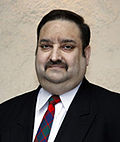
|
Hanzala Malik[143] | Glasgow | 2011 | 2016 | Defeated | British Pakistani/White British (Mixed) | |
| SNP | 
|
Humza Yousaf[144] | Glasgow | 2011 | Serving | British Pakistani | ||
| Labour | 
|
Anas Sarwar[143] | Glasgow | 2016 | Serving | British Pakistani | ||
| Labour | 
|
Foysol Choudhury[145] | Lothian | 2021 | Serving | British Bangladeshi | ||
| Conservative | 
|
Pam Gosal | West Scotland | 2021 | Serving | British Indian | ||
| Conservative | 
|
Sandesh Gulhane | Glasgow | 2021 | Serving | British Indian | ||
| SNP | 
|
Kaukab Stewart[146] | Glasgow | 2021 | Serving | British Pakistani | ||
Senedd
[edit]First Ministers of Wales
[edit]| Party | Portrait | Name | Constituency | First office held | Year appointed | Ethnicity | |
|---|---|---|---|---|---|---|---|
| Labour | 
|
Vaughan Gething[3][147] | Cardiff South and Penarth | First Minister of Wales | 2024 | Black British/White British (Mixed) | |
Members of the Welsh Government Cabinet in the Senedd
[edit]| Party | Portrait | Name | Constituency | First office held | Year appointed | Ethnicity | |
|---|---|---|---|---|---|---|---|
| Labour | 
|
Vaughan Gething[3][147] | Cardiff South and Penarth | Minister for Health and Social Services | 2016 | Black British/White British (Mixed) | |
Welsh Government Junior Ministers in the Senedd
[edit]| Party | Portrait | Name | Constituency | First office held | Year appointed | Ethnicity | |
|---|---|---|---|---|---|---|---|
| Labour | 
|
Vaughan Gething[3][147] | Cardiff South and Penarth | Deputy Minister for Tackling Poverty | 2013 | Black British/White British (Mixed) | |
Members of the Senedd
[edit]| Party | Portrait | Name | Constituency | Year elected | Year left | Reason for tenure ending | Ethnicity | |
|---|---|---|---|---|---|---|---|---|
| Plaid Cymru | 
|
Mohammad Asghar[3][147] | South Wales East | 2007 | 2009 (Crossed the floor in 2009) | Left Plaid Cymru, joined Conservative Party | British Pakistani | |
| Conservative | South Wales East | 2009 | 2020 | Died in office | ||||
| Labour | 
|
Vaughan Gething[3][147] | Cardiff South and Penarth | 2011 | Serving | Black British/White British (Mixed) | ||
| Conservative | 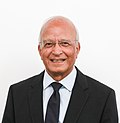
|
Altaf Hussain[148] | South Wales West | 2015 | 2016 | Defeated | British Indian | |
| 2021 | Serving | |||||||
| Conservative | 
|
Natasha Asghar[149] | South Wales East | 2021 | Serving | British Pakistani | ||
Northern Ireland Assembly
[edit]Members of the Northern Ireland Assembly
[edit]| Party | Portrait | Name | Constituency | Year elected | Year left | Reason for tenure ending | Ethnicity | |
|---|---|---|---|---|---|---|---|---|
| Alliance | 
|
Anna Lo[150] | Belfast South | 2007 | 2016 | Retired | British Chinese Irish Chinese | |
Police and Crime Commissioners
[edit]| Party | Portrait | Name | Constituency | Year elected | Year left | Reason for tenure ending | Ethnicity | |
|---|---|---|---|---|---|---|---|---|
| Labour | 
|
Hardyal Dhindsa[151] | Derbyshire | 2016 | 2021 | Defeated | British Indian | |
| Conservative | 
|
Festus Akinbusoye[152] | Bedfordshire | 2021 | 2024 | Defeated | Black British | |
| Labour | Gary Godden | Nottinghamshire | 2024 | Serving | Black British/White British (Mixed) | |||
| Labour | Nicolle Ndiweni[153] | Derbyshire | 2024 | Serving | Black British | |||
| Labour | 
|
Emma Wools | South Wales | 2024 | Serving | Black British/White British (Mixed) | ||
Combined authorities and combined county authorities
[edit]Deputy mayors for policing and crime
[edit]| Party | Portrait | Name | Role | Year appointed | Year left | Reason for tenure ending | Ethnicity | |
|---|---|---|---|---|---|---|---|---|
| Labour Co-op | Alison Lowe | Deputy Mayor of West Yorkshire for Policing and Crime | 2021 | Black British/White Irish (Mixed) | ||||
| Labour | Kilvinder Vigurs | Deputy Mayor of South Yorkshire for Policing and Crime | 2025 | |||||
Local authorities
[edit]Directly elected mayors
[edit]| Party | Portrait | Name | Constituency | Year elected | Year left | Reason for tenure ending | Ethnicity | ||
|---|---|---|---|---|---|---|---|---|---|
| Independent | 
|
Lutfur Rahman | Mayor of Tower Hamlets | 2010 | 2014 (Crossed the floor in 2014) | Created Tower Hamlets First | British Bangladeshi | ||
| Tower Hamlets First | 2014 | 2015 | Election court found corrupt or illegal practices and removed from office | ||||||
| Aspire | 2022 | Serving | |||||||
| Labour | 
|
Marvin Rees | Mayor of Bristol | 2016 | 2024 | Office abolished | Black British/White British (Mixed) | ||
| Labour | 
|
Rokhsana Fiaz | Mayor of Newham | 2018 | Serving | British Pakistani[154] | |||
| Labour | Joanne Anderson | Mayor of Liverpool | 2021 | 2023 | Office abolished | Black British | |||
| Labour Co-op | Brenda Dacres | Mayor of Lewisham | 2024 | Serving | Black British | ||||
Notes
[edit]- ^ Priddy, Sarah (26 September 2023). "Historical representation of minority ethnic groups in the House of Commons" (PDF). House of Commons Library. Retrieved 5 November 2024.
- ^ a b c d e f Lees, Rebecca (28 October 2020). "Who were the first MPs from ethnic minority backgrounds?".
- ^ a b c d e f g h i j k l m n o p q r s t u v w x y z aa ab ac ad ae af ag ah ai aj ak al am Audickas, Lukas; Apostolova, Vyara (28 June 2017). Ethnic Minorities in Politics and Public Life (PDF) (Report). Briefing paper. Vol. SN01156. House of Commons Library. p. 5. Archived from the original (PDF) on 29 July 2017. Retrieved 29 July 2017.
- ^ "OLIVER, Richard (1735–84), of Fenchurch St., London | History of Parliament Online". www.historyofparliamentonline.org. Retrieved 16 July 2020.
- ^ Duffy, Judith (28 February 2021). "Anas Sarwar named Scottish Labour leader – but indyref2 is 'elephant in the room'". The National. Retrieved 4 March 2021.
- ^ Pearce, Tilly (2 March 2021). "BBC's Politics Live under fire as four non-Jews asked if they agree Jewish people are ethnic minority". Metro. Retrieved 4 March 2021.
- ^ Carrell, Severin (1 March 2021). "Scottish Labour leader calls for UK to move closer to single market". The Guardian. Retrieved 4 March 2021.
- ^ a b Bush, Stephen (1 March 2021). "Debating whether Jews are an ethnic minority is a familiar mistake by BBC Politics Live". New Statesman. Retrieved 4 March 2021.
- ^ a b Sobolewska, Maria (2025). "Ethnic minority representation after the 2024 general election: Does ethnicity no longer matter?". Political Quarterly. doi:10.1111/1467-923X.13502.
- ^ Muhammad Anwar (2001). "The participation of ethnic minorities in British politics". Journal of Ethnic and Migration Studies. 27 (3): 533–549. doi:10.1080/136918301200266220. S2CID 144867334.
- ^ Geddes, Andrew (1998). "Inequality, political opportunity and ethnic minority parliamentary candidacy". In Saggar, Shamit (ed.). Race and British Electoral Politics. Routledge. pp. 145–172. ISBN 978-1-135-35947-8.
- ^ a b c d e f Dr Justin Fisher (Brunel University), Prof. Edward Fieldhouse (University of Manchester), Prof. David Denver (Lancaster University), Dr Andrew Russell (University of Manchester), Dr David Cutts (University of Manchester) (25 August 2005). "The General Election 2005 Campaign Analysis; Produced for the Electoral Commission" Archived 23 September 2015 at the Wayback Machine, Electoral Commission.
- ^ a b c d "Characteristics of the new House of Commons: key issues for the 2010 Parliament". Parliament of the United Kingdom. Archived from the original on 20 June 2015. Retrieved 16 June 2015. This article contains material from this source, which is available under the Open Parliament Licence Archived 12 February 2016 at the Wayback Machine.
- ^ a b c d e f g h i j k l m n o p q r s t u v w x y z aa ab ac ad ae af ag ah ai aj ak al am an ao ap aq ar as at au av aw ax ay az ba bb bc bd be bf bg bh bi bj bk bl bm bn bo bp bq br bs bt bu bv bw bx by bz ca John Wood & Richard Cracknell; Social and General Statistics Section (16 October 2013). "Ethnic Minorities in Politics, Government and Public Life" (PDF). Parliament of the United Kingdom. Archived (PDF) from the original on 7 July 2015. Retrieved 29 July 2017.
{{cite web}}: CS1 maint: multiple names: authors list (link) - ^ "The class of 2015 enter Britain's most diverse ever parliament". British Future. 8 May 2015. Archived from the original on 28 April 2016. Retrieved 22 April 2016.
- ^ Wilson, Cherry (11 June 2017). "Election results 2017: The most diverse Parliament yet". BBC News. Archived from the original on 12 June 2017. Retrieved 12 June 2017.
- ^ Audickas, Lukas; Cracknell, Richard; Bellis, Alexander (5 November 2019). Social background of MPs 1979–2017 (PDF) (Report). Briefing paper. Vol. CBP-7483. House of Commons Library. pp. 9–10. Archived (PDF) from the original on 5 January 2020. Retrieved 24 November 2019.
- ^ a b c d Uberoi, Elise; Burton, Matthew. "Ethnic diversity in politics and public life". House of Commons Library. Retrieved 25 November 2022.
- ^ "Landmark for representation as diversity of parliament nears that of electorate". British Future. 5 July 2024. Retrieved 5 November 2024.
- ^ "As it happened: Rishi Sunak reinstates fracking ban and faces Starmer at PMQS". 25 October 2022.
- ^ "Queen Victoria's First Christmas: A Politically Incorrect Jamaican Footnote". 13 January 2017.
- ^ "US genealogist believes owner of Muckross House was descended from slave".
- ^ "History made as Boateng becomes first black cabinet minister". TheGuardian.com. 30 May 2002.
- ^ "Sadiq Khan named first Muslim cabinet minister". 6 June 2009.
- ^ "Witham MP Priti Patel joins Cabinet". 11 May 2015.
- ^ "Alok Sharma becomes Secretary of state for International Development". 25 July 2019.
- ^ "Who's who in Boris Johnson's new Cabinet". 25 July 2019.
- ^ "Rishi Sunak: Murthys delighted as son-in-law enters Boris Johnson's cabinet – Times of India". The Times of India. 28 July 2019.
- ^ Boycott-Owen, Mason (2 March 2021). "Suella Braverman becomes first Cabinet minister to take paid maternity leave". The Telegraph.
- ^ "Kwasi Kwarteng named first black business secretary as Alok Sharma leads United Nations COP26". 9 January 2021.
- ^ a b "Parliamentary career for Nadhim Zahawi – MPs and Lords – UK Parliament".
- ^ Maidment, Jack; Penna, Dominic (7 July 2022). "Boris Johnson resigns: New policies must wait for next leader, says PM". The Telegraph.
- ^ a b "Parliamentary career for Kemi Badenoch – MPs and Lords – UK Parliament".
- ^ a b "Parliamentary career for Mr Ranil Jayawardena – MPs and Lords – UK Parliament".
- ^ "Ministerial appointments: 31 August 2023". 31 August 2023.
- ^ a b Vaz, J. Clement (1997). Profiles of Eminent Goans, Past and Present. Concept Publishing Company. p. 262. ISBN 8170226198.
- ^ "Lord Coe". UK Parliament.
- ^ "Lord Boateng". UK Parliament.
- ^ "Parliamentary career for Keith Vaz – MPs and Lords – UK Parliament".
- ^ "Mr David Lammy". UK Parliament.
- ^ "Parliamentary career for Mr Parmjit Dhanda – MPs and Lords – UK Parliament".
- ^ a b "Parliamentary career for Mr Shahid Malik – MPs and Lords – UK Parliament".
- ^ "Parliamentary career for Dawn Butler – MPs and Lords – UK Parliament".
- ^ "Parliamentary career for Sajid Javid – MPs and Lords – UK Parliament".
- ^ "Parliamentary career for Mrs Helen Grant – MPs and Lords – UK Parliament".
- ^ "Parliamentary career for Shailesh Vara – MPs and Lords – UK Parliament".
- ^ "Parliamentary career for Priti Patel – MPs and Lords – UK Parliament".
- ^ "Parliamentary career for Mr Sam Gyimah – MPs and Lords – UK Parliament".
- ^ "Parliamentary career for Alok Sharma – MPs and Lords – UK Parliament".
- ^ "Parliamentary career for Kwasi Kwarteng – MPs and Lords – UK Parliament".
- ^ "Parliamentary career for Suella Braverman – MPs and Lords – UK Parliament".
- ^ "Parliamentary career for Rishi Sunak – MPs and Lords – UK Parliament".
- ^ "Parliamentary career for Ms Nusrat Ghani – MPs and Lords – UK Parliament".
- ^ "Parliamentary career for James Cleverly – MPs and Lords – UK Parliament".
- ^ "Parliamentary career for Seema Kennedy – MPs and Lords – UK Parliament".
- ^ "Parliamentary career for Alan Mak – MPs and Lords – UK Parliament".
- ^ a b c "Ministerial appointments: July 2022". 7 July 2022.
- ^ "Ministerial appointments: 18 September 2023". 18 September 2023.
- ^ a b "Ministerial appointments: November 2023". 13 November 2023.
- ^ "Summary of Individual | Legacies of British Slavery".
- ^ "Summary of Individual | Legacies of British Slavery".
- ^ "Discovering Britain's first Asian MP | Race | the Guardian".
- ^ a b c d e Cracknell, Richard (5 January 2012). "Ethnic Minorities in Politics, Government and Public Life" (PDF). House of Commons Library. Archived from the original (PDF) on 21 June 2015.
- ^ Goodrich, Amanda (8 April 2019). "Ethnic minorities in Parliament: a new addition to the Victorian Commons". The Victorian Commons. The History of Parliament Trust. Retrieved 28 April 2020.
- ^ "Queen Victoria's First Christmas: A Politically Incorrect Jamaican Footnote". 13 January 2017.
- ^ "US genealogist believes owner of Muckross House was descended from slave".
- ^ Campsie, Alison (26 July 2020). "Memorial calls for Scotland's 'forgotten' first non-white MP". The Scotsman.
- ^ "Queen Victoria's First Christmas: A Politically Incorrect Jamaican Footnote". 13 January 2017.
- ^ "US genealogist believes owner of Muckross House was descended from slave".
- ^ "Queen Victoria's First Christmas: A Politically Incorrect Jamaican Footnote". 13 January 2017.
- ^ "US genealogist believes owner of Muckross House was descended from slave".
- ^ Walford, Edward (1919). The county families of the United Kingdom; or, Royal manual of the titled and untitled aristocracy of England, Wales, Scotland, and Ireland. p. 1242.
- ^ Manning, Nathan (18 January 2017). Political (dis)engagement: The Changing Nature of the 'political'. Policy Press. ISBN 9781447317029. Retrieved 18 February 2018 – via Google Books.
- ^ "Gang of Four: 25 years since their election, has change occurred? - OBV". www.obv.org.uk. Archived from the original on 13 November 2017. Retrieved 18 February 2018.
- ^ a b c d e f g h i j k l Judge, David (2005). "Microcosmic representation". Representation: Theory and Practice in Britain. Routledge. p. 41. ISBN 978-1-134-89170-2. Retrieved 29 August 2017.
- ^ a b "Is Sebastian Coe too good to be true?". The Guardian. 19 August 2015. Archived from the original on 3 December 2018. Retrieved 3 December 2018.
- ^ a b "Rebecca Tyrrel: 'For such a bastion of Home Counties values, Lord Coe has quite the gene pool'". Independent.co.uk. 20 July 2012. Archived from the original on 4 December 2018. Retrieved 3 December 2018.
- ^ a b Fordyce, Tom (6 October 2010). "Tom Fordyce: False starts and big questions". BBC Blogs. Archived from the original on 16 April 2019. Retrieved 23 December 2019.
- ^ a b "The Melting Pot Generation: How Britain became more relaxed about race" (PDF). BritainThinks. British Future. December 2012. Archived (PDF) from the original on 10 September 2018. Retrieved 3 December 2018.
- ^ "Record number of new minority MPs". BBC News. 10 May 2005. Archived from the original on 29 July 2017. Retrieved 29 July 2017.
- ^ Helena Bengtsson (8 May 2015). "Record numbers of female and minority-ethnic MPs in new House of Commons". The Guardian. Archived from the original on 9 March 2017. Retrieved 12 December 2016.
- ^ a b Lester Holloway (7 April 2015). "The Tories are becoming the party of ethnic diversity – Labour has to respond". The Guardian. Archived from the original on 16 April 2016. Retrieved 12 December 2016.
- ^ a b c d e f g h i j k l m "52 minority MPs to sit in 'most diverse UK parliament ever'". British Future. 9 June 2017. Archived from the original on 17 June 2017. Retrieved 13 June 2017.
- ^ "British Cypriot wins seat in House of Commons". Cyprus Mail. 9 June 2017. Archived from the original on 11 June 2017. Retrieved 17 June 2017.
- ^ Simons, Ned (7 December 2017). "17 From '17: Layla Moran On Her 'Anarchism' And The Demise Of British Politics". HuffPost. Archived from the original on 8 February 2018. Retrieved 7 February 2018.
- ^ "Layla Moran". Libdems-org. 16 January 2014. Archived from the original on 28 May 2019. Retrieved 10 June 2017.
- ^ Brady, Poppy (9 June 2017). "Enoch Powell's old seat filled by Midlands' first black MP". The Voice. Archived from the original on 14 June 2017. Retrieved 17 June 2017.
- ^ "Everything you need to know about Labour's newest MP Janet Daby". Daily Mirror. 15 June 2018. Archived from the original on 16 June 2018. Retrieved 10 July 2018.
- ^ Browning, Steve (30 May 2019). "Ethnic diversity in politics and public Life" (PDF). House of Commons Library. Archived (PDF) from the original on 7 February 2017. Retrieved 10 September 2019.
- ^ a b c d e f g h i j k l m n o p q r s t Uberoi, Elise; Lees, Rebecca (22 October 2020). Ethnic diversity in politics and public life (PDF) (Report). Briefing Paper. Vol. CBP 01156. House of Commons Library. Retrieved 22 November 2020.
- ^ "2019 intake of BAME MPs should be celebrated – but more must be done". LabourList. 24 December 2019.
- ^ a b "Narayana Murthy's son-in-law among record 15 Indian-origin winners in UK polls". Hindustan Times. 13 December 2019. Archived from the original on 13 December 2019. Retrieved 14 December 2019.
- ^ Bussey, Katrine (14 May 2021). "New SNP MP Anum Qaisar-Javed 'proud' to be role model for minorities after Airdrie and Shotts by-election win". The Independent. Retrieved 14 May 2021.
- ^ Haynes, Jane (26 January 2022). "Birmingham could get first black MP after Paulette Hamilton wins Erdington by-election nod". Birmingham Mail. Retrieved 4 March 2022.
- ^ a b "Parliamentary career for Baroness Amos – MPs and Lords – UK Parliament".
- ^ a b "Parliamentary career for Baroness Scotland of Asthal – MPs and Lords – UK Parliament".
- ^ "Parliamentary career for Baroness Warsi – MPs and Lords – UK Parliament".
- ^ "Parliamentary career for Lord Darzi of Denham – MPs and Lords – UK Parliament".
- ^ "Parliamentary career for Baroness Vadera – MPs and Lords – UK Parliament".
- ^ "Parliamentary career for Lord Patel of Bradford – MPs and Lords – UK Parliament".
- ^ "Parliamentary career for Baroness Verma – MPs and Lords – UK Parliament".
- ^ "Parliamentary career for Lord Ahmad of Wimbledon – MPs and Lords – UK Parliament".
- ^ "Parliamentary career for Lord Popat – MPs and Lords – UK Parliament".
- ^ a b "Parliamentary career for Baroness Manzoor – MPs and Lords – UK Parliament".
- ^ "Ministerial appointments: September 2021". 16 September 2021.
- ^ "Lord Khan of Burnley". 9 July 2024.
- ^ Singh, Payal (15 May 1988). "Noble House". The Illustrated Weekly of India.
- ^ "House of Lords – Wednesday 18 June 1969 – Hansard – UK Parliament".
- ^ a b Saggar, Shamit (2004). "Foreword". Race And British Electoral Politics. Routledge. p. x. ISBN 978-1-135-35947-8. Retrieved 29 August 2017.
- ^ a b c d e f Smith, Ben (18 November 2008). "Ethnic Minorities in Politics, Government and Public Life". Parliament of the United Kingdom. Archived from the original on 13 August 2017. Retrieved 12 August 2017.
- ^ Purvis, Matthew (11 June 2014). "Membership of the House of Lords: Ethnicity, Religion and Disability" (PDF). House of Lords Library. p. 5. Archived (PDF) from the original on 13 August 2017. Retrieved 12 August 2017.
- ^ Butt, Riazat (30 March 2009). "Michael Nazir-Ali steps down to focus on helping persecuted Christians". The Guardian. Archived from the original on 5 December 2018. Retrieved 6 December 2018.
- ^ "Parliamentary career for Lord Lindsay of Birker – MPs and Lords – UK Parliament".
- ^ Suspended till 2012 for having been jailed due to United Kingdom Parliamentary expenses scandal
- ^ Suspended for four months due to United Kingdom Parliamentary expenses scandal
- ^ Suspended for 16 months due to United Kingdom Parliamentary expenses scandal
- ^ Suspended after being jailed for a fatal road crash in 2007 and expelled 2009 for racial remarks
- ^ "Parliamentary career for Lord Sinha – MPs and Lords – UK Parliament".
- ^ Suspended for eight months due to United Kingdom Parliamentary expenses scandal
- ^ "Baroness Falkner". UK Parliament.
- ^ a b c d Audickas, Lukas (4 March 2016). "Ethnic Minorities in Politics and Public Life" (PDF). House of Commons Library. Archived (PDF) from the original on 10 November 2016. Retrieved 12 August 2017.
- ^ "Parliamentary career for Lord Hussain – MPs and Lords – UK Parliament".
- ^ "Baroness Osamor joins the House of Lords". BBC News. 4 December 2018. Archived from the original on 5 December 2018. Retrieved 6 December 2018.
- ^ "British Pakistani Zameer Choudrey appointed to the House of Lords". TheNews.com.pk. 10 September 2019. Archived from the original on 31 October 2019. Retrieved 26 October 2019.
- ^ "Lord Rami Ranger CBE". Archived from the original on 29 January 2020. Retrieved 29 January 2020.
- ^ "Lord Kamall". UK Parliament.
- ^ "Lord Khan of Burnley". UK Parliament.
- ^ "Lord Sikka". UK Parliament.
- ^ "First Church of England female bishop from a minority ethnic community". Anglican Communion News Service. 12 July 2017. Retrieved 9 November 2021.
- ^ "'Baroness of Hall Green' – activist Shaista Gohir made life peer". 23 May 2022.
- ^ "Muslim Women Network".
- ^ a b c d "Labour Research". Labour Research Department. 2009.
- ^ Tim Ross (24 January 2015). "Ukip MEP Amjad Bashir defects to Conservative Party". The Telegraph. Archived from the original on 22 November 2018. Retrieved 4 April 2018.
- ^ Syal, Rajeev; Sedghi, Ami (13 July 2014). "Parliament failing to represent UK's ethnic diversity". The Guardian. Archived from the original on 29 July 2017. Retrieved 29 July 2017.
- ^ "Gay Brexit Party candidate: 'We're not all homophobic racists'". Pink News. 25 April 2019. Archived from the original on 27 May 2019. Retrieved 27 May 2019.
- ^ "What the world makes of Khan's victory". BBC News. 7 May 2016. Archived from the original on 23 May 2019. Retrieved 23 May 2019.
- ^ "London deputy mayor resigns". Independent. Independent Digital News & Media Ltd. 4 July 2008. Archived from the original on 5 December 2008. Retrieved 2 August 2024.
- ^ "Munira Mirza: PM's 'nonsense detector' who has attacked racism claims". The Guardian. Guardian News & Media Limited. 15 June 2020. Archived from the original on 9 May 2024. Retrieved 9 May 2024.
- ^ "New deputy mayor Debbie Weekes-Bernard predicts Brexit will trigger a spike in racist hate crime". Evening Standard. Evening Standard Ltd. 12 March 2019. Archived from the original on 2 August 2024. Retrieved 2 August 2024.
- ^ "Courage. Excellence. Freedom: David Kurten is the man". 2 August 2017. Archived from the original on 24 June 2019. Retrieved 24 June 2019.
- ^ a b c Nasar Meer (20 May 2011). "What would independence mean for Scotland's racial minorities?". The Guardian. Archived from the original on 5 March 2016. Retrieved 12 December 2016.
- ^ Cairney, Paul; McGarvey, Neil (2008). "Assessing Scottish Democracy". Scottish Politics: An Introduction. Palgrave Macmillan. p. 226. ISBN 978-1-137-10178-5. Retrieved 29 August 2017.[permanent dead link]
- ^ a b Severin Carrell (9 May 2011). "Call for action to increase number of women in devolved parliaments". The Guardian. Archived from the original on 4 June 2016. Retrieved 12 December 2016.
- ^ Nasar Meer (20 May 2011). "What would independence mean for Scotland's racial minorities?". The Guardian. Archived from the original on 5 March 2016. Retrieved 12 December 2016.
- ^ "Foysol Choudhury becomes first Bangladeshi-origin Scottish parliamentarian". Dhaka Tribune. 9 May 2021. Retrieved 10 May 2021.
- ^ "Holyrood set to welcome first Muslim/ BAME woman MSP". The Muslim News. 27 November 2020. Retrieved 8 May 2021.
- ^ a b c d e Jones, Moya (2014). "Multicultural Challenges to Modern Wales". In R. Garbaye; P. Schnapper (eds.). The Politics of Ethnic Diversity in the British Isles. Springer. p. 147. ISBN 978-1-137-35154-8. Retrieved 29 August 2017.
- ^ "First three openly gay and lesbian AMs 'a milestone'". BBC News. 7 May 2016. Archived from the original on 5 October 2017. Retrieved 29 July 2017.
- ^ "Natasha Asghar becomes first woman of colour to be elected to the Senedd". ITV (published 8 May 2021). 10 May 2021. Daughter of Mohammad Asghar
- ^ "Threat to only ethnic minority politician in Northern Ireland". The Telegraph. 30 June 2009. Archived from the original on 19 September 2018. Retrieved 4 April 2018.
- ^ "Police and Crime Commissioner Elections: Significant Reduction in Ethnic Minority Candidates" (PDF). Elevation Networks. p. 2. Archived (PDF) from the original on 7 December 2018. Retrieved 6 December 2018.
- ^ "The man on a mission to cut truanting".
- ^ "Derbyshire PCC: Labour's Nicolle Ndiweni elected". BBC News. 2024-05-03. Retrieved 2024-05-16.
- ^ "New Labour mayor Rohksana Fiaz plans to abolish her role". BBC. 4 May 2018. Archived from the original on 13 April 2019. Retrieved 23 May 2019.
 KSF
KSF